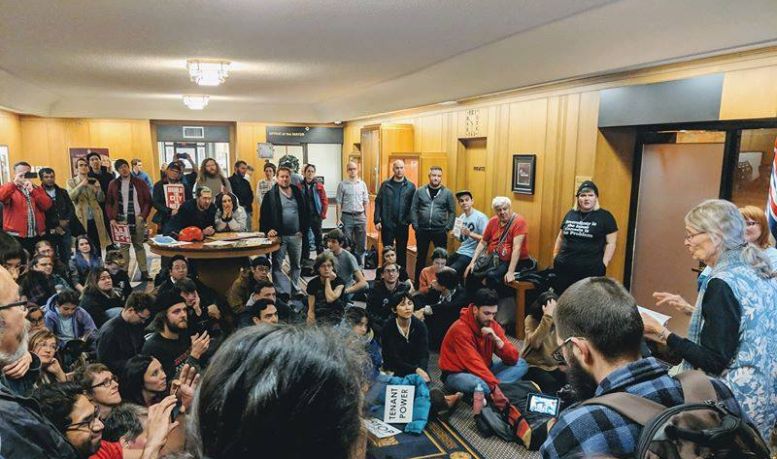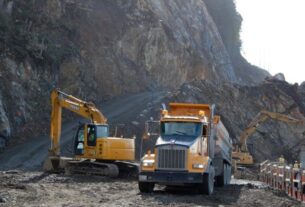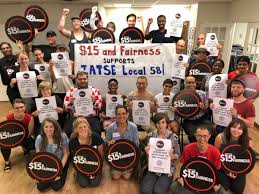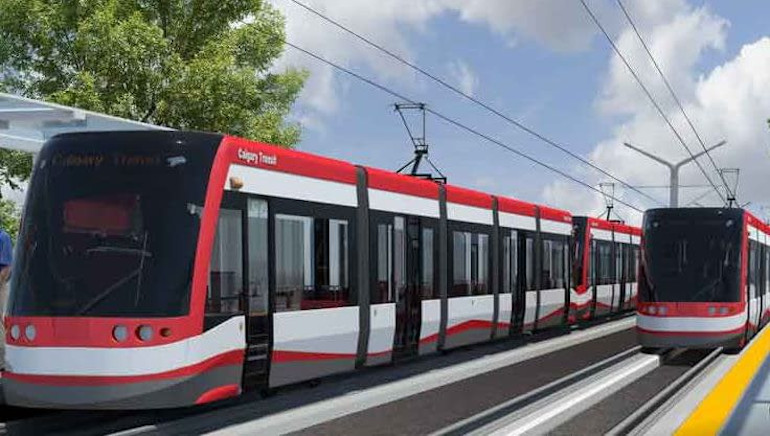What started out as a very confusing election ended up with a clear result. A triumph for a new right-wing party – ABC.
ABC’s mayoral candidate, Ken Sim, won an absolute majority of the votes cast, 51 percent, 85,732 votes compared to former Mayor Stewart’s 49,593 votes. All ABC’s seven council candidates were elected, as were their six Park Board and five School Board candidates. In each case their candidates were the highest finishers and won enough seats to have majority.
It is a resounding victory. The lowest ranked of ABC’s candidates in all three elections were 19,000 votes above the highest other elected candidate. They pulled together an impressive and rarely achieved majority of voters, who voted fairly uniformly for ABC’s slate of candidates.
What Happened
After the 2018 election, the traditional right-wing party, the NPA, had won five of ten seats on Council. The left also had five seats with three Greens, one representative of OneCity (a soft-left party), and Jean Swanson of COPE, the party that stood up for renters and workers. Kennedy Stewart, a former NDP politician, was elected mayor with 49,705 votes to Sim, then with NPA, on 48,748 votes. City policies largely continued as they had before the 2018 election — pro-developers with progressive social policies.
However, this bland soft-left approach did not tackle any of Vancouver’s deep problems. The housing crisis got worse with soaring rents and impossible house prices. Homelessness increased as the poorest were driven out of homes. The poisoned drug pandemic of death and misery got worse. Into the mix was the devastation of COVID.
As the stresses of life intensified, it took its toll on people’s physical and mental health. Workers are exhausted and burnt out. People are angry and stressed and coming into the election were looking for people to blame.
A Multitude of Parties
The 2022 election saw a bewildering array of parties, mostly with meaningless names. The NPA, with five elected councillors in 2018, shattered after its board was taken over by reactionary social conservatives, triggering four of the five councillors to leave. Three helped found ABC, one set up TEAM and one stayed with NPA.
The splintered right, which was apparent months ago, deluded the soft left to think the election was theirs. There was at least a tacit understanding, and it may have been more than that, that Kennedy Stewart, the incumbent mayor, would be unopposed for mayor while he would not run any councillors. The three leftish parties with sitting councillors — the Greens, OneCity and COPE — put forward 13 candidates for 10 seats, so they would inevitably compete with each other. Then Vision, a party that had dominated Vancouver from 2008 to being wiped out in the 2018 election, tried to raise the dead with three candidates.
The debacle for the green/soft left vote was virtually assured when Mayor Kennedy Stewart decided to run six council candidates. It is widely believed his main motive was to allow him to spend more money in the election as there is a limit on spending for each candidate. Stewart knew he faced a stiff challenge from Sim so wanted to spend more to try to get re-elected. He spent lots of money, much from developers, but failed miserably in the election with only 29 percent of the votes. Numerically, his vote was just 112 less than it was in 2018 when he narrowly carved out a victory over Sim. His main impact, in running six candidates for council, was to contribute to the right-wing’s victory.
The serious left was represented by COPE. In addition, there were two minor parties: a very confused bag called Progress Vancouver and Vote Socialist.
ABC Victory
ABC steamrollered the election, crushing NPA and only allowing Team to win 10 percent of the votes. ABC concentrated on “safety,” exploiting fears of crime, with a promise to hire 100 more police. However, ABC did not put forward the usual reactionary policies; they say they support diversity and inclusion.
Their answer to the housing crisis is through working with the market and developers to speed up approval processes. Clearly the developers, and others of the super-rich, appreciated ABC’s policies as they had many of the maximum allowed donations and raised the most money.
ABC gained wide support from many recent immigrants, especially from the Chinese community. Sim’s parents immigrated from Hong Kong, and he made a big deal of being second-generation Chinese. He also highlighted that he would be the first non-white mayor of Vancouver, a city with a majority of non “European Canadians.”
ABC was well organized and ran enough candidates to win a majority on Council, Park and Schools, while leaving a few spots for other candidates, and so maximized their vote.
Safety, Crime and Police
The mainstream parties concentrated on “safety” in the election, although housing was the biggest concern for voters. By most calculations, Vancouver is not a dangerous city. However, facts and perceptions are quite different. It is true that as homelessness and mental illness increase, there is a sense of insecurity. There has been an increase in random assaults, driven at least in part due to toxic drugs. Racist attacks have increased, especially impacting people of East Asian origin, due to false blaming for COVID, and an emboldened far-right. Indigenous people, especially young women, continue to be over-represented in those who suffer attacks and murders.
Policing was a major issue in Surrey’s election, which resulted in the sitting Mayor’s defeat.
Sim did effectively turn the “defund the police” slogan against the left. ABC’s policies resulted in Vancouver’s police “union” voting for the first time ever to support a party in the city’s election, endorsing ABC.
Simply calling for defunding the police can alienate many working-class people, who are most likely to be the victims of crime. Police budgets continue to grow while community services face cuts, and the reality is that more police will not improve public safety, but socialists need a clear positive program for how to address the safety concerns of working-class people. A better approach is to argue for democratic community control of the police, and more appropriate use of resources to support mental health workers, peer support for drug users, etc. This is especially true as the Police Board is an appointed body (by the Province) and City Council has little to no control over its budget.
It is dubious whether 100 extra police will have any impact on either the facts or the feelings about crime. Police largely react after a crime, rather than prevent crime, which is about much deeper issues. What is more likely is that the rhetoric about safety will result in more harassment of homeless people and more poor bashing.
Left Failure
In 2018, voters elected Jean Swanson to city council. She has been the best elected representative for working people in city hall, for decades. She took a worker’s wage, came from a movement-building tradition and always defended renters.
Yet in this election, many on the left did nothing to help her get re-elected. There was widespread complacency that Jean would be safely re-elected. There is also a section of workers who say they don’t vote, in effect giving the well-off — who generally do vote — two votes. Turnout in the election was down from 39.4 percent in 2018 to 36.3 percent in 2022 — it seems likely the left was less energized, while the right around ABC was motivated.
Vote Socialist didn’t take votes from Swanson. However, many of their organizers previously had helped COPE and their absence left gaps in COPE’s campaign. The Vancouver Tenants’ Union did not endorse COPE, and are influenced by anarchist ideas against electoral politics, even though COPE has the best policies for renters and Jean has been a tireless fighter for renters. Fightback, which claims to fight for socialism and which internationally helped to elect even right-wing Labour MPs, ignored the election entirely. The Communist Party office in Vancouver had a poster in its window for OneCity.
Socialist Alternative, in contrast, worked hard for six weeks to defend Jean Swanson’s seat and tried to elect more COPE candidates.
The ABC wave, the splitting of the left votes and the failings of the left to support COPE, resulted in a setback for Vancouver’s working class with the defeat of Jean, the loss of any COPE representatives on Park Board and only one elected — Suzie Mah to School Board.
Looking Ahead
ABC has a solid majority on Vancouver council. However, as they rely on the market, the housing crisis will continue, and may even get worse as big corporations and speculators increasingly move into rental housing. It is market “solutions” that got Vancouver, and many other cities, into this mess.
Homelessness will get worse. The new council may not go ahead with appealing an unelected judge’s decision to overturn a Vancouver bylaw to protect SROs from steep rent increases.
The world is heading towards a major recession in the next year, or even sooner. This will add to the misery for working people as unemployment increases. Unemployment with high mortgage repayments will cause people to lose their recently-purchased homes.
The recession of 2008-09 temporarily stunned workers, but then in 2011 upheavals erupted, from the Indignados in Spain, Occupy in many countries, the Arab Spring, the Maple spring in Québec and more.
ABC will not deliver. The election is a setback, but not the end of struggle. Hopefully, the wider left will recognize the need to organize and mobilize and stand in solidarity.
Socialist Alternative will continue our proud record of campaigning for rent control and public housing, mobilizing to stop the climate crisis, fighting discrimination and working for a socialist transformation.




